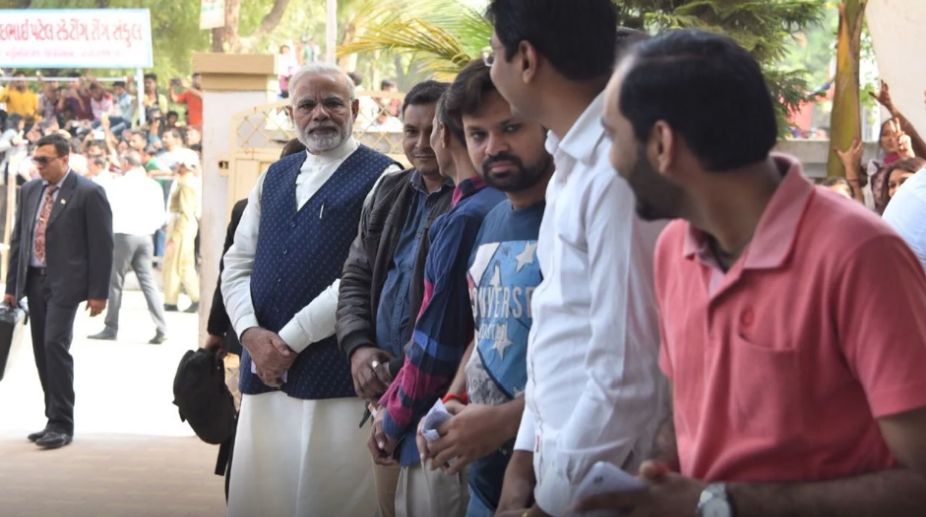The second and final phase of the Gujarat Assembly elections on Thursday saw 68.70 per cent ballotting across 14 districts of the northern and central regions of the state, to pick 93 lawmakers.
Though voting in the second phase was a bit higher than the first phase, it is still less than the previous elections.
Advertisement
All eyes now await December 18 when the results of the polls will be declared.
The second phase was to pick 93 seats, out of the total 182 constituency seats. There were 851 candidates in the fray and around 2.23 crore voters.
The first phase on December 9 saw 66.75 per cent ballotting from the Suarashtra-Kutch and southern regions of Gujarat. The combined figures of the state assembly elections stands at around 67.75 per cent — lower than the 72 per cent of the 2012 Assembly elections.
The maximum polling was registered in Sabarkantha district with 77 per cent, and the minimum in Dahod district with 60 per cent. Surprisingly, both the districts are dominated by tribal population.
While both the main political parties claimed to have an upper hand in the results of the elections, most of the electronic media channels ran exit polls showing the ruling BJP once again forming the government.
The second phase also saw some controversy, as Congress created a furore over Prime Minister Narendra Modi’s “road show” in Ahmedabad during polling. Modi, registered as a voter in the Ranip area of Ahmedabad, exercised his right at the polling booth at Nishan Vidyalaya in Ranip region of the city. After casting his vote, Modi stood on the steps of his vehicle and held out his inked finger for people to see, for quite a distance, and waved to the crowd. He even walked on the road with his voting finger raised and later climbed on his vehicle, as he continued to acknowledge the crowd shouting “Modi, Modi…”. This, Congress complained, was nothing but a road show and against the model code of conduct.
According to the Chief Electoral Officer (CEO), Gujarat office, B.B. Swain, the elections were relatively peaceful, barring a few complaints of skirmishes reported from places like Anand, Vadodara, Mehsana and Dahod. An incident of group clash between two groups of different political parties was reported at Nana Arad, near Dharamshala in Anand district, where complaints of bogus voting was reported. According to the CEO, the situation was brought under control.
In Ranavav, Rabaari Mohalla in Vankaner in Bhadarva police stations in Vadodara district, the police registered a criminal complaint against two groups that clashed. According to the CEO, the incident had nothing to do with elections. In another incident of two groups of communities clashing was reported in Hassanpur village in Visnagar town, Mehsana district, where four persons were injured and admitted in Visnagar general hospital. The police is in the process of registering a complaint in the incident.
In Patadra village, Fatehpura in Sukhsar police station in Dahod district, a criminal offence was registered by police against a person, Sureshbhai Ramsinh Baraiya, and 10 others for insisting that people vote for a particular political party, which led to an altercation with a person, Badrabhai Kalubhai Dangi.
“The elections overall remained peaceful throughout and we thank all those who helped us, cooperated with us including the media. The first phase problems helped us in improving and reducing the EVMs and VVPATs to be replaced. On Thursday, we only had to replace 0.8 per cent Ballot Units, 0.6 per cent Control Units and about 1.86 per cent VVPATs,” said Swain.
The Gujarat Assembly polls were being seen not just as a prestige battle between the Prime Minister and Congress president-designate Rahul Gandhi but also as a mini referendum on Modi’s three and a half year rule at the Centre, especially in the wake of issues like demonetisation, implementation of the Goods and Services Tax (GST), rising unemployment and the Minimum Support Price (MSP) for farm commodities dominating most part of the campaign discourse initially.
With the support of young agitating leaders like Hardik Patel, Alpesh Thakore and Jignesh Mewani, the Congress hopes to make a dent in the BJP bastions of Saurashtra-Kutch, South and Central Gujarat on the economic issues, as well as keep its house in North Gujarat intact on the Patel-OBC-Dalit consolidation basis.
On the other hand, the ruling BJP is pinning all its hopes on the strength of Prime Minister Modi’s persona, the “micro-management” of elections by party president Amit Shah as well as huge advantage it has so far had in vote share, especially in 84 seats of urban Gujarat where it had won 59.5 per cent vote share, compared to 32.8 per cent by Congress in 2012.











